Organizational Behaviour: Culture, Power, Politics, Motivation & Teams
VerifiedAdded on 2023/06/18
|17
|5191
|291
Report
AI Summary
This report provides a comprehensive analysis of organizational behavior, focusing on the influence of culture, power, and politics on individuals and teams within KPMG, a well-known consultancy firm. It examines various cultural dimensions, including task, person, and role cultures, as well as Hofstede's cultural dimensions theory. The report also discusses different types of power, such as legitimate, reward, referent, informational, and expert power, and their impact on employee behavior. Furthermore, it explores the role of positive and negative politics within an organization. The second part of the report delves into motivation theories, including content theories like Maslow's hierarchy of needs and process theories like Adam's equity theory, and their application in achieving organizational goals. The report critically evaluates the relationship between culture, power, politics, and motivation in fostering team and organizational success and assesses team development theories and philosophies that influence workplace behavior to improve productivity and performance.
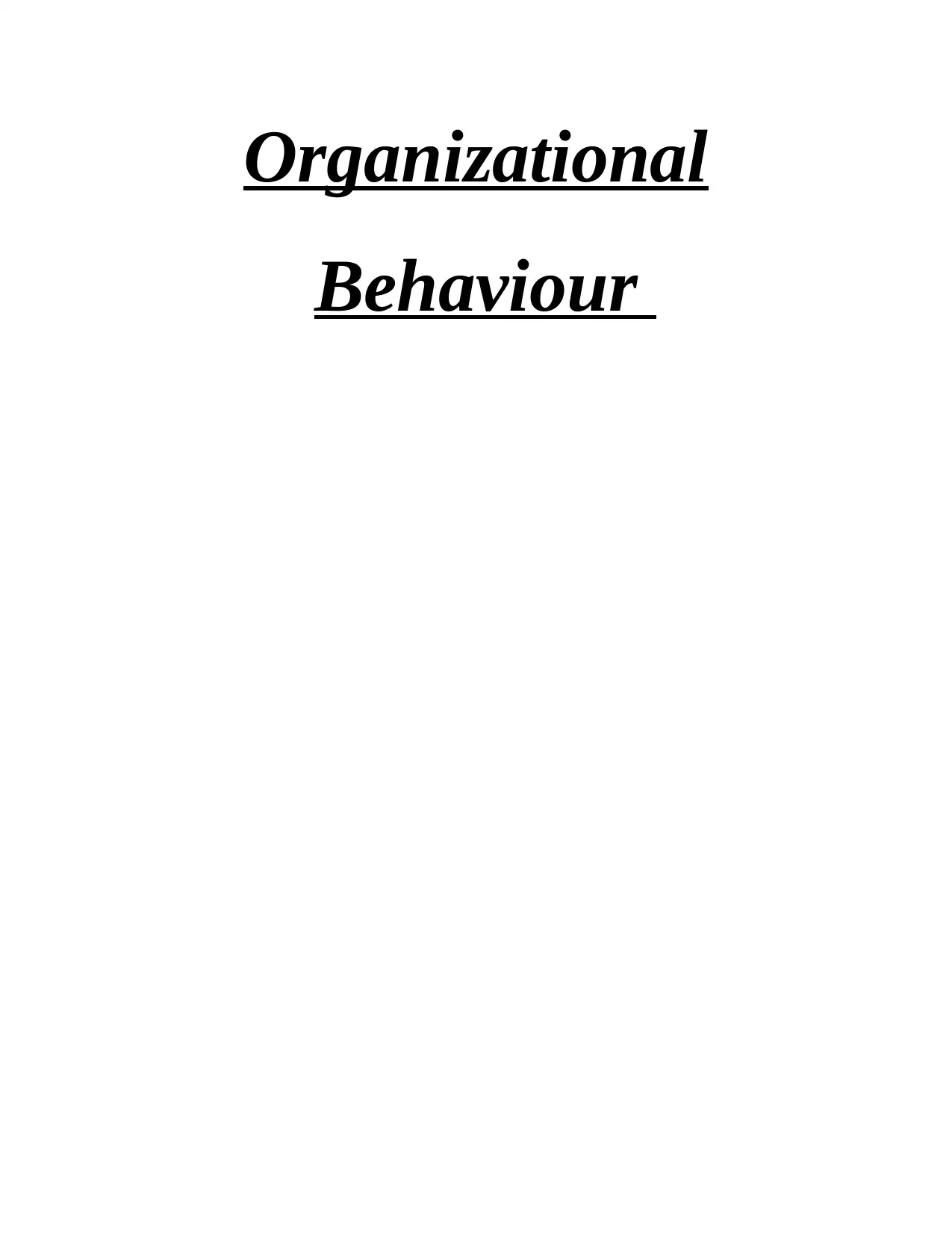
Organizational
Behaviour
Behaviour
Paraphrase This Document
Need a fresh take? Get an instant paraphrase of this document with our AI Paraphraser
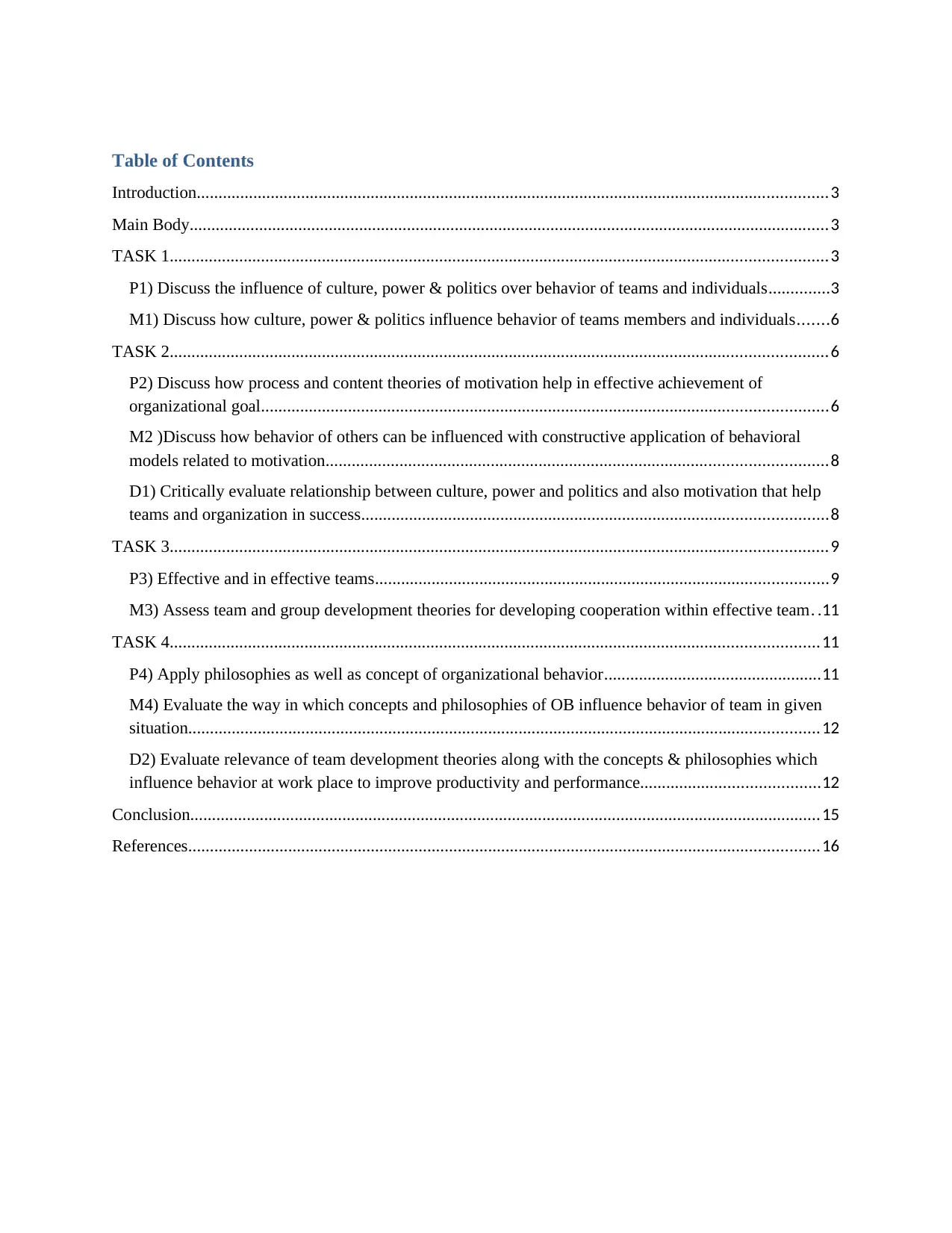
Table of Contents
Introduction.................................................................................................................................................3
Main Body...................................................................................................................................................3
TASK 1.......................................................................................................................................................3
P1) Discuss the influence of culture, power & politics over behavior of teams and individuals..............3
M1) Discuss how culture, power & politics influence behavior of teams members and individuals.......6
TASK 2.......................................................................................................................................................6
P2) Discuss how process and content theories of motivation help in effective achievement of
organizational goal..................................................................................................................................6
M2 )Discuss how behavior of others can be influenced with constructive application of behavioral
models related to motivation...................................................................................................................8
D1) Critically evaluate relationship between culture, power and politics and also motivation that help
teams and organization in success...........................................................................................................8
TASK 3.......................................................................................................................................................9
P3) Effective and in effective teams........................................................................................................9
M3) Assess team and group development theories for developing cooperation within effective team. .11
TASK 4.....................................................................................................................................................11
P4) Apply philosophies as well as concept of organizational behavior..................................................11
M4) Evaluate the way in which concepts and philosophies of OB influence behavior of team in given
situation.................................................................................................................................................12
D2) Evaluate relevance of team development theories along with the concepts & philosophies which
influence behavior at work place to improve productivity and performance.........................................12
Conclusion.................................................................................................................................................15
References.................................................................................................................................................16
Introduction.................................................................................................................................................3
Main Body...................................................................................................................................................3
TASK 1.......................................................................................................................................................3
P1) Discuss the influence of culture, power & politics over behavior of teams and individuals..............3
M1) Discuss how culture, power & politics influence behavior of teams members and individuals.......6
TASK 2.......................................................................................................................................................6
P2) Discuss how process and content theories of motivation help in effective achievement of
organizational goal..................................................................................................................................6
M2 )Discuss how behavior of others can be influenced with constructive application of behavioral
models related to motivation...................................................................................................................8
D1) Critically evaluate relationship between culture, power and politics and also motivation that help
teams and organization in success...........................................................................................................8
TASK 3.......................................................................................................................................................9
P3) Effective and in effective teams........................................................................................................9
M3) Assess team and group development theories for developing cooperation within effective team. .11
TASK 4.....................................................................................................................................................11
P4) Apply philosophies as well as concept of organizational behavior..................................................11
M4) Evaluate the way in which concepts and philosophies of OB influence behavior of team in given
situation.................................................................................................................................................12
D2) Evaluate relevance of team development theories along with the concepts & philosophies which
influence behavior at work place to improve productivity and performance.........................................12
Conclusion.................................................................................................................................................15
References.................................................................................................................................................16
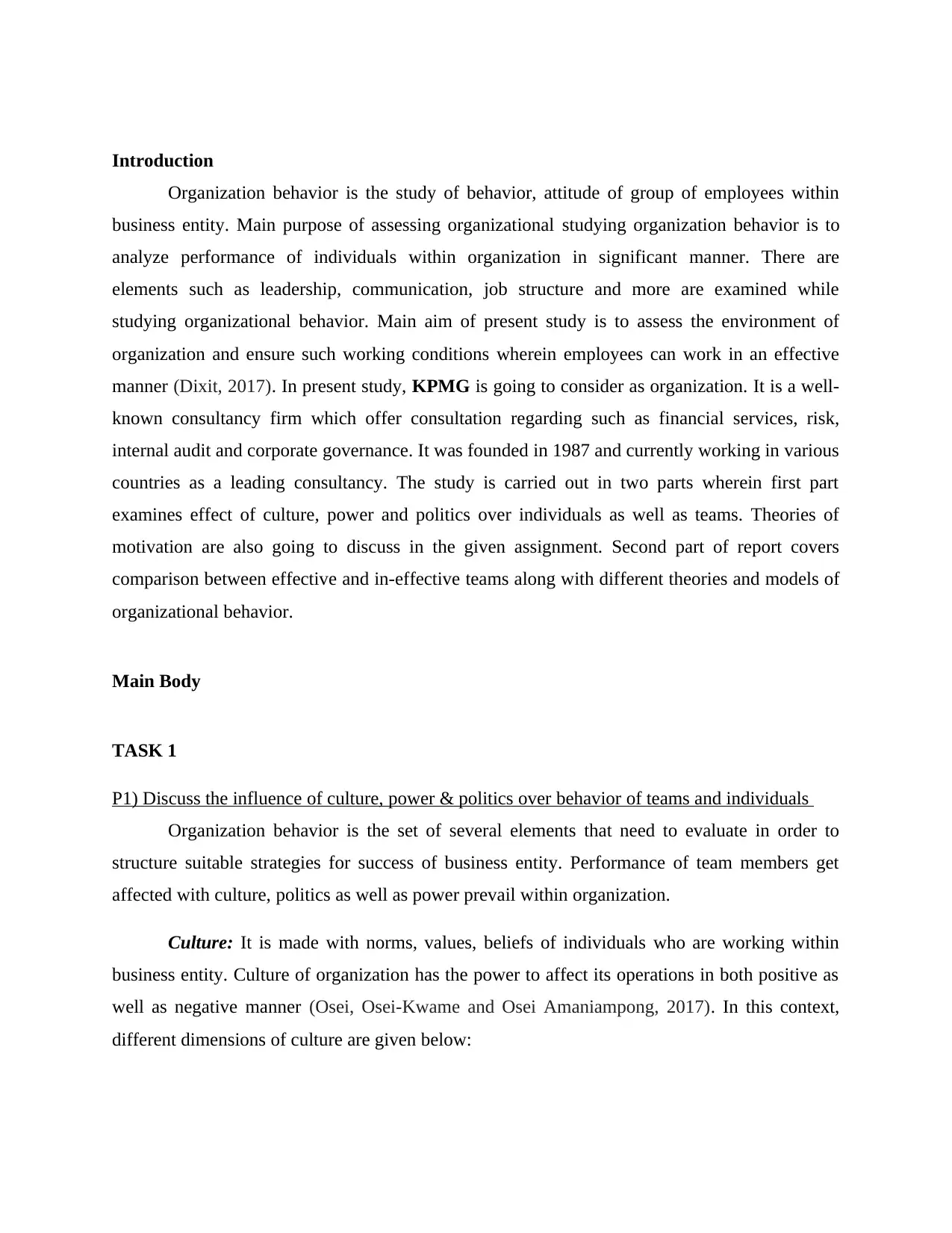
Introduction
Organization behavior is the study of behavior, attitude of group of employees within
business entity. Main purpose of assessing organizational studying organization behavior is to
analyze performance of individuals within organization in significant manner. There are
elements such as leadership, communication, job structure and more are examined while
studying organizational behavior. Main aim of present study is to assess the environment of
organization and ensure such working conditions wherein employees can work in an effective
manner (Dixit, 2017). In present study, KPMG is going to consider as organization. It is a well-
known consultancy firm which offer consultation regarding such as financial services, risk,
internal audit and corporate governance. It was founded in 1987 and currently working in various
countries as a leading consultancy. The study is carried out in two parts wherein first part
examines effect of culture, power and politics over individuals as well as teams. Theories of
motivation are also going to discuss in the given assignment. Second part of report covers
comparison between effective and in-effective teams along with different theories and models of
organizational behavior.
Main Body
TASK 1
P1) Discuss the influence of culture, power & politics over behavior of teams and individuals
Organization behavior is the set of several elements that need to evaluate in order to
structure suitable strategies for success of business entity. Performance of team members get
affected with culture, politics as well as power prevail within organization.
Culture: It is made with norms, values, beliefs of individuals who are working within
business entity. Culture of organization has the power to affect its operations in both positive as
well as negative manner (Osei, Osei-Kwame and Osei Amaniampong, 2017). In this context,
different dimensions of culture are given below:
Organization behavior is the study of behavior, attitude of group of employees within
business entity. Main purpose of assessing organizational studying organization behavior is to
analyze performance of individuals within organization in significant manner. There are
elements such as leadership, communication, job structure and more are examined while
studying organizational behavior. Main aim of present study is to assess the environment of
organization and ensure such working conditions wherein employees can work in an effective
manner (Dixit, 2017). In present study, KPMG is going to consider as organization. It is a well-
known consultancy firm which offer consultation regarding such as financial services, risk,
internal audit and corporate governance. It was founded in 1987 and currently working in various
countries as a leading consultancy. The study is carried out in two parts wherein first part
examines effect of culture, power and politics over individuals as well as teams. Theories of
motivation are also going to discuss in the given assignment. Second part of report covers
comparison between effective and in-effective teams along with different theories and models of
organizational behavior.
Main Body
TASK 1
P1) Discuss the influence of culture, power & politics over behavior of teams and individuals
Organization behavior is the set of several elements that need to evaluate in order to
structure suitable strategies for success of business entity. Performance of team members get
affected with culture, politics as well as power prevail within organization.
Culture: It is made with norms, values, beliefs of individuals who are working within
business entity. Culture of organization has the power to affect its operations in both positive as
well as negative manner (Osei, Osei-Kwame and Osei Amaniampong, 2017). In this context,
different dimensions of culture are given below:
⊘ This is a preview!⊘
Do you want full access?
Subscribe today to unlock all pages.

Trusted by 1+ million students worldwide
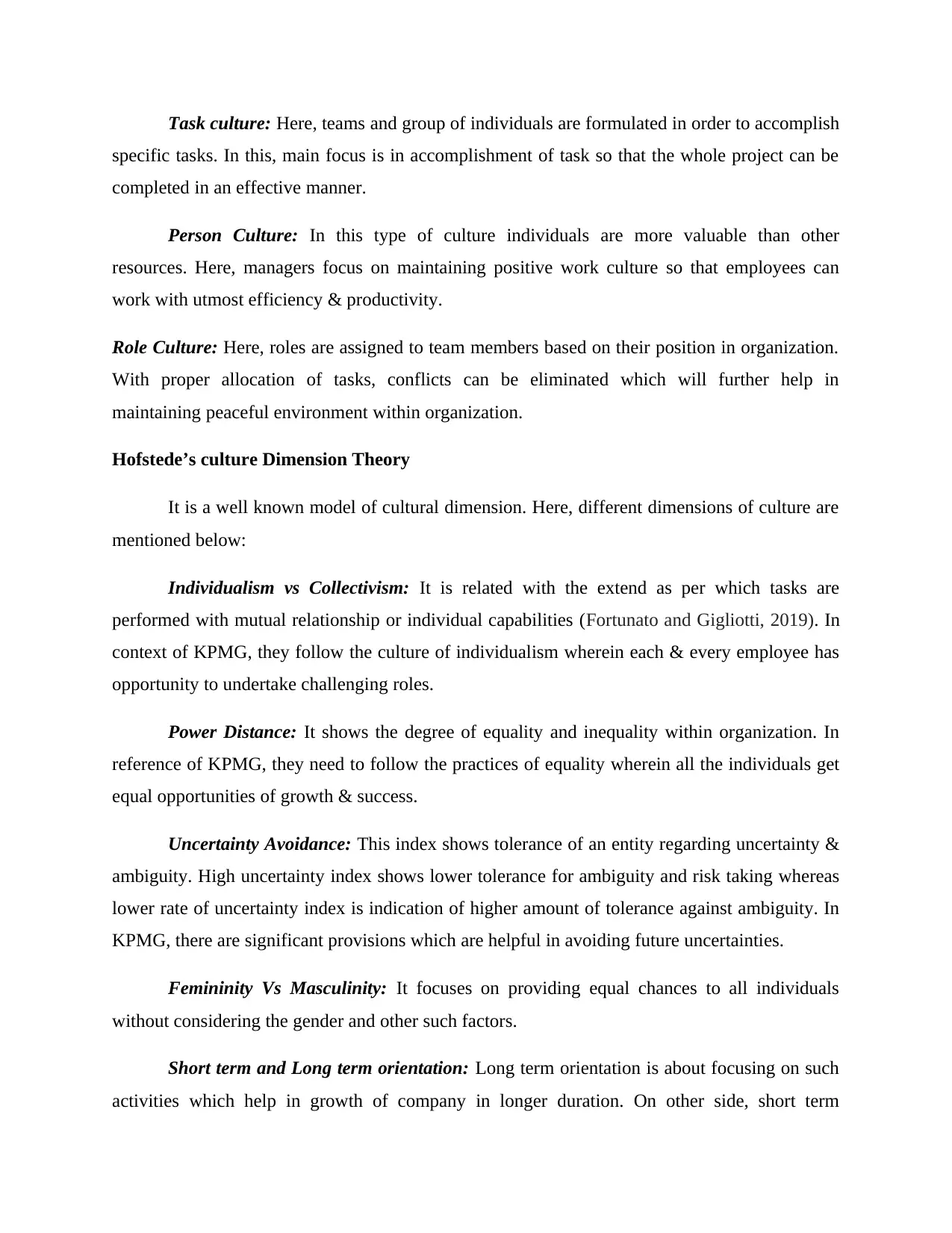
Task culture: Here, teams and group of individuals are formulated in order to accomplish
specific tasks. In this, main focus is in accomplishment of task so that the whole project can be
completed in an effective manner.
Person Culture: In this type of culture individuals are more valuable than other
resources. Here, managers focus on maintaining positive work culture so that employees can
work with utmost efficiency & productivity.
Role Culture: Here, roles are assigned to team members based on their position in organization.
With proper allocation of tasks, conflicts can be eliminated which will further help in
maintaining peaceful environment within organization.
Hofstede’s culture Dimension Theory
It is a well known model of cultural dimension. Here, different dimensions of culture are
mentioned below:
Individualism vs Collectivism: It is related with the extend as per which tasks are
performed with mutual relationship or individual capabilities (Fortunato and Gigliotti, 2019). In
context of KPMG, they follow the culture of individualism wherein each & every employee has
opportunity to undertake challenging roles.
Power Distance: It shows the degree of equality and inequality within organization. In
reference of KPMG, they need to follow the practices of equality wherein all the individuals get
equal opportunities of growth & success.
Uncertainty Avoidance: This index shows tolerance of an entity regarding uncertainty &
ambiguity. High uncertainty index shows lower tolerance for ambiguity and risk taking whereas
lower rate of uncertainty index is indication of higher amount of tolerance against ambiguity. In
KPMG, there are significant provisions which are helpful in avoiding future uncertainties.
Femininity Vs Masculinity: It focuses on providing equal chances to all individuals
without considering the gender and other such factors.
Short term and Long term orientation: Long term orientation is about focusing on such
activities which help in growth of company in longer duration. On other side, short term
specific tasks. In this, main focus is in accomplishment of task so that the whole project can be
completed in an effective manner.
Person Culture: In this type of culture individuals are more valuable than other
resources. Here, managers focus on maintaining positive work culture so that employees can
work with utmost efficiency & productivity.
Role Culture: Here, roles are assigned to team members based on their position in organization.
With proper allocation of tasks, conflicts can be eliminated which will further help in
maintaining peaceful environment within organization.
Hofstede’s culture Dimension Theory
It is a well known model of cultural dimension. Here, different dimensions of culture are
mentioned below:
Individualism vs Collectivism: It is related with the extend as per which tasks are
performed with mutual relationship or individual capabilities (Fortunato and Gigliotti, 2019). In
context of KPMG, they follow the culture of individualism wherein each & every employee has
opportunity to undertake challenging roles.
Power Distance: It shows the degree of equality and inequality within organization. In
reference of KPMG, they need to follow the practices of equality wherein all the individuals get
equal opportunities of growth & success.
Uncertainty Avoidance: This index shows tolerance of an entity regarding uncertainty &
ambiguity. High uncertainty index shows lower tolerance for ambiguity and risk taking whereas
lower rate of uncertainty index is indication of higher amount of tolerance against ambiguity. In
KPMG, there are significant provisions which are helpful in avoiding future uncertainties.
Femininity Vs Masculinity: It focuses on providing equal chances to all individuals
without considering the gender and other such factors.
Short term and Long term orientation: Long term orientation is about focusing on such
activities which help in growth of company in longer duration. On other side, short term
Paraphrase This Document
Need a fresh take? Get an instant paraphrase of this document with our AI Paraphraser
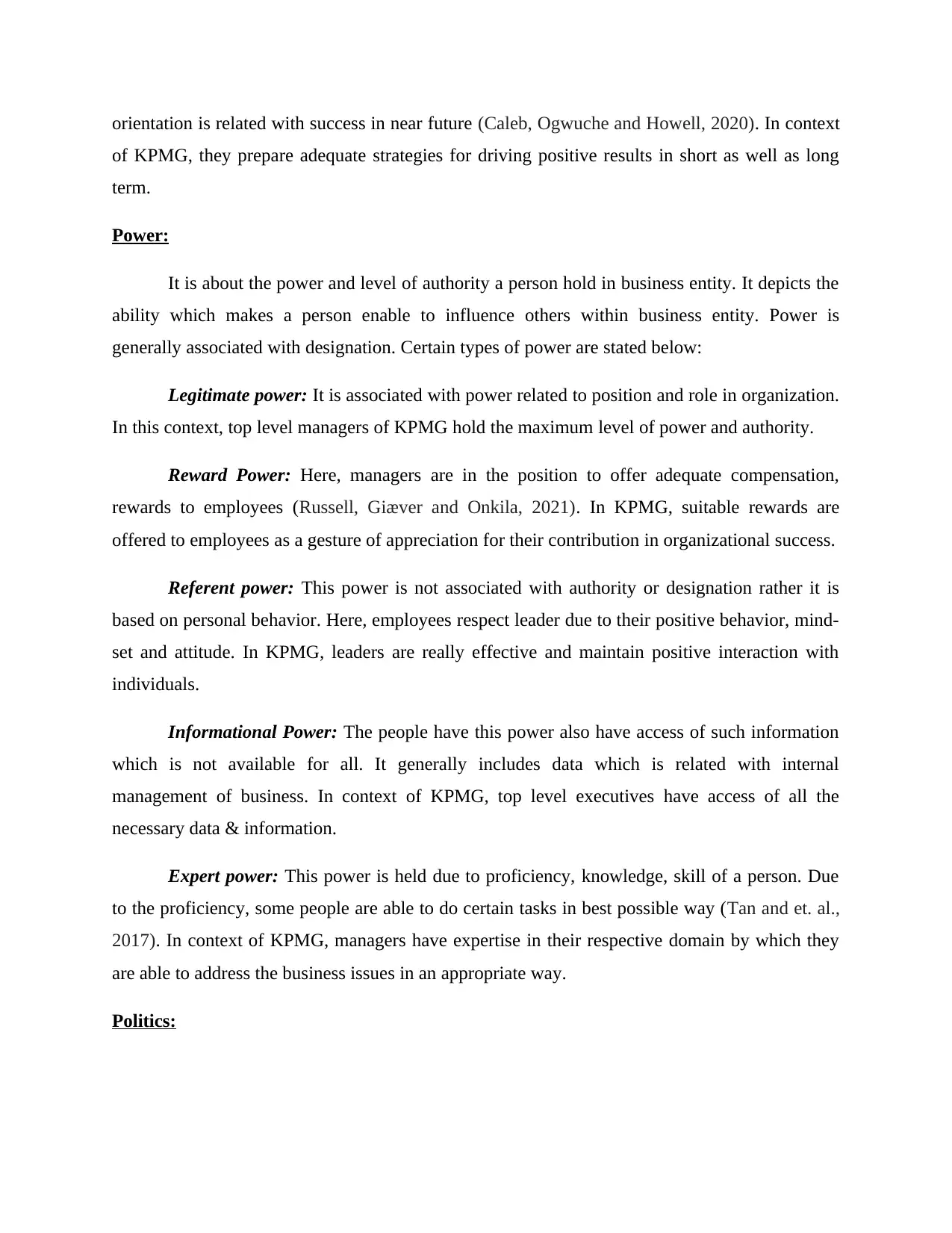
orientation is related with success in near future (Caleb, Ogwuche and Howell, 2020). In context
of KPMG, they prepare adequate strategies for driving positive results in short as well as long
term.
Power:
It is about the power and level of authority a person hold in business entity. It depicts the
ability which makes a person enable to influence others within business entity. Power is
generally associated with designation. Certain types of power are stated below:
Legitimate power: It is associated with power related to position and role in organization.
In this context, top level managers of KPMG hold the maximum level of power and authority.
Reward Power: Here, managers are in the position to offer adequate compensation,
rewards to employees (Russell, Giæver and Onkila, 2021). In KPMG, suitable rewards are
offered to employees as a gesture of appreciation for their contribution in organizational success.
Referent power: This power is not associated with authority or designation rather it is
based on personal behavior. Here, employees respect leader due to their positive behavior, mind-
set and attitude. In KPMG, leaders are really effective and maintain positive interaction with
individuals.
Informational Power: The people have this power also have access of such information
which is not available for all. It generally includes data which is related with internal
management of business. In context of KPMG, top level executives have access of all the
necessary data & information.
Expert power: This power is held due to proficiency, knowledge, skill of a person. Due
to the proficiency, some people are able to do certain tasks in best possible way (Tan and et. al.,
2017). In context of KPMG, managers have expertise in their respective domain by which they
are able to address the business issues in an appropriate way.
Politics:
of KPMG, they prepare adequate strategies for driving positive results in short as well as long
term.
Power:
It is about the power and level of authority a person hold in business entity. It depicts the
ability which makes a person enable to influence others within business entity. Power is
generally associated with designation. Certain types of power are stated below:
Legitimate power: It is associated with power related to position and role in organization.
In this context, top level managers of KPMG hold the maximum level of power and authority.
Reward Power: Here, managers are in the position to offer adequate compensation,
rewards to employees (Russell, Giæver and Onkila, 2021). In KPMG, suitable rewards are
offered to employees as a gesture of appreciation for their contribution in organizational success.
Referent power: This power is not associated with authority or designation rather it is
based on personal behavior. Here, employees respect leader due to their positive behavior, mind-
set and attitude. In KPMG, leaders are really effective and maintain positive interaction with
individuals.
Informational Power: The people have this power also have access of such information
which is not available for all. It generally includes data which is related with internal
management of business. In context of KPMG, top level executives have access of all the
necessary data & information.
Expert power: This power is held due to proficiency, knowledge, skill of a person. Due
to the proficiency, some people are able to do certain tasks in best possible way (Tan and et. al.,
2017). In context of KPMG, managers have expertise in their respective domain by which they
are able to address the business issues in an appropriate way.
Politics:
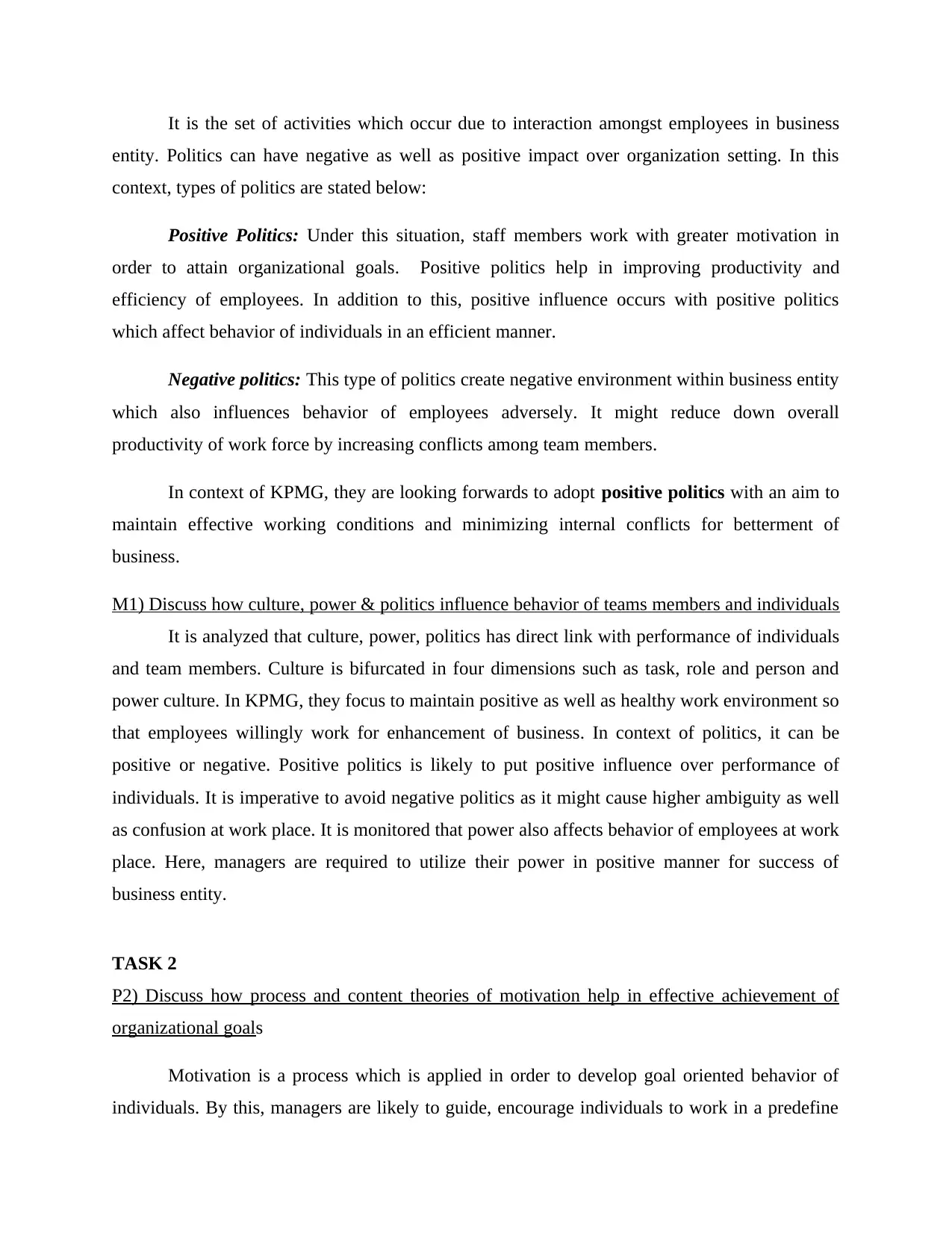
It is the set of activities which occur due to interaction amongst employees in business
entity. Politics can have negative as well as positive impact over organization setting. In this
context, types of politics are stated below:
Positive Politics: Under this situation, staff members work with greater motivation in
order to attain organizational goals. Positive politics help in improving productivity and
efficiency of employees. In addition to this, positive influence occurs with positive politics
which affect behavior of individuals in an efficient manner.
Negative politics: This type of politics create negative environment within business entity
which also influences behavior of employees adversely. It might reduce down overall
productivity of work force by increasing conflicts among team members.
In context of KPMG, they are looking forwards to adopt positive politics with an aim to
maintain effective working conditions and minimizing internal conflicts for betterment of
business.
M1) Discuss how culture, power & politics influence behavior of teams members and individuals
It is analyzed that culture, power, politics has direct link with performance of individuals
and team members. Culture is bifurcated in four dimensions such as task, role and person and
power culture. In KPMG, they focus to maintain positive as well as healthy work environment so
that employees willingly work for enhancement of business. In context of politics, it can be
positive or negative. Positive politics is likely to put positive influence over performance of
individuals. It is imperative to avoid negative politics as it might cause higher ambiguity as well
as confusion at work place. It is monitored that power also affects behavior of employees at work
place. Here, managers are required to utilize their power in positive manner for success of
business entity.
TASK 2
P2) Discuss how process and content theories of motivation help in effective achievement of
organizational goals
Motivation is a process which is applied in order to develop goal oriented behavior of
individuals. By this, managers are likely to guide, encourage individuals to work in a predefine
entity. Politics can have negative as well as positive impact over organization setting. In this
context, types of politics are stated below:
Positive Politics: Under this situation, staff members work with greater motivation in
order to attain organizational goals. Positive politics help in improving productivity and
efficiency of employees. In addition to this, positive influence occurs with positive politics
which affect behavior of individuals in an efficient manner.
Negative politics: This type of politics create negative environment within business entity
which also influences behavior of employees adversely. It might reduce down overall
productivity of work force by increasing conflicts among team members.
In context of KPMG, they are looking forwards to adopt positive politics with an aim to
maintain effective working conditions and minimizing internal conflicts for betterment of
business.
M1) Discuss how culture, power & politics influence behavior of teams members and individuals
It is analyzed that culture, power, politics has direct link with performance of individuals
and team members. Culture is bifurcated in four dimensions such as task, role and person and
power culture. In KPMG, they focus to maintain positive as well as healthy work environment so
that employees willingly work for enhancement of business. In context of politics, it can be
positive or negative. Positive politics is likely to put positive influence over performance of
individuals. It is imperative to avoid negative politics as it might cause higher ambiguity as well
as confusion at work place. It is monitored that power also affects behavior of employees at work
place. Here, managers are required to utilize their power in positive manner for success of
business entity.
TASK 2
P2) Discuss how process and content theories of motivation help in effective achievement of
organizational goals
Motivation is a process which is applied in order to develop goal oriented behavior of
individuals. By this, managers are likely to guide, encourage individuals to work in a predefine
⊘ This is a preview!⊘
Do you want full access?
Subscribe today to unlock all pages.

Trusted by 1+ million students worldwide
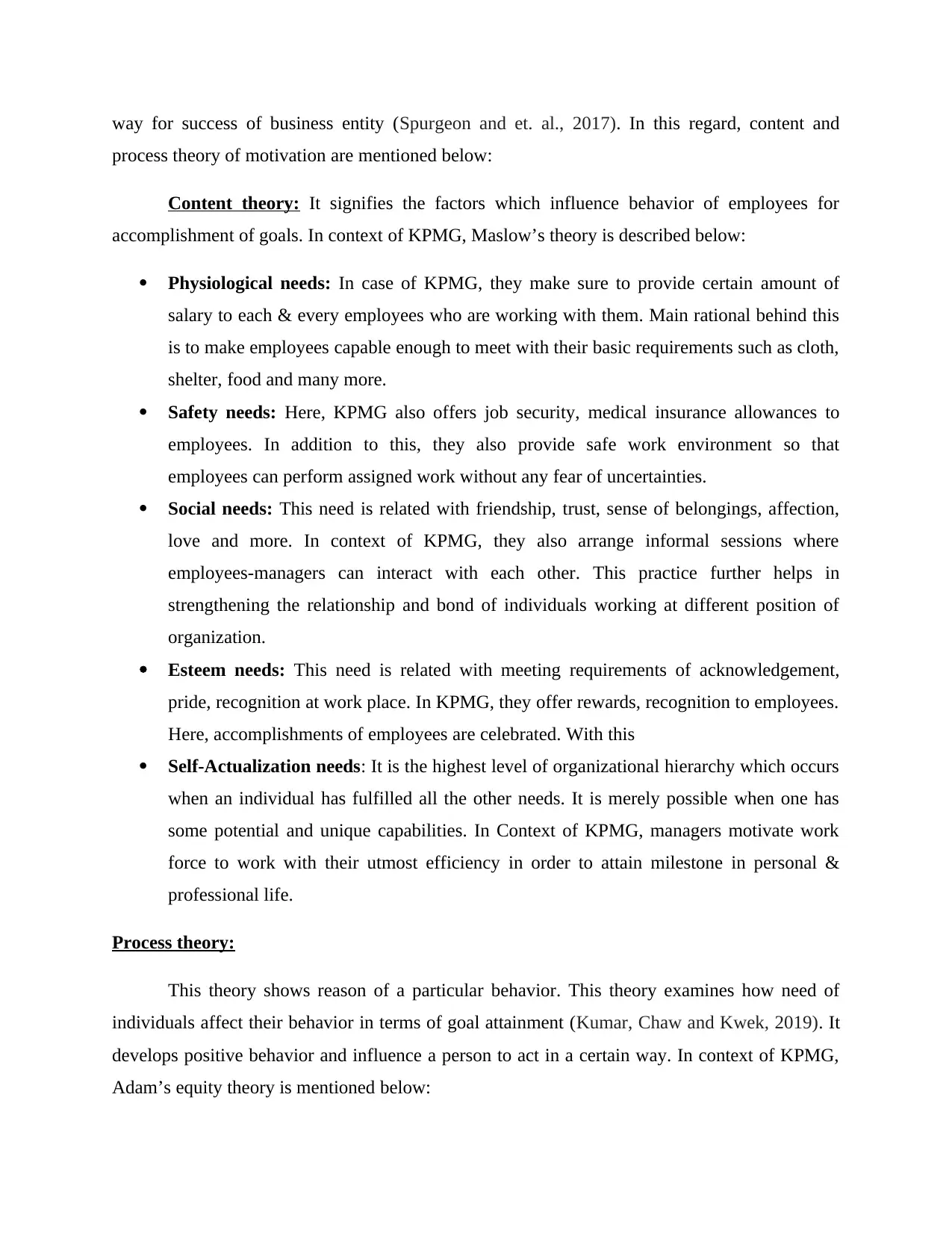
way for success of business entity (Spurgeon and et. al., 2017). In this regard, content and
process theory of motivation are mentioned below:
Content theory: It signifies the factors which influence behavior of employees for
accomplishment of goals. In context of KPMG, Maslow’s theory is described below:
Physiological needs: In case of KPMG, they make sure to provide certain amount of
salary to each & every employees who are working with them. Main rational behind this
is to make employees capable enough to meet with their basic requirements such as cloth,
shelter, food and many more.
Safety needs: Here, KPMG also offers job security, medical insurance allowances to
employees. In addition to this, they also provide safe work environment so that
employees can perform assigned work without any fear of uncertainties.
Social needs: This need is related with friendship, trust, sense of belongings, affection,
love and more. In context of KPMG, they also arrange informal sessions where
employees-managers can interact with each other. This practice further helps in
strengthening the relationship and bond of individuals working at different position of
organization.
Esteem needs: This need is related with meeting requirements of acknowledgement,
pride, recognition at work place. In KPMG, they offer rewards, recognition to employees.
Here, accomplishments of employees are celebrated. With this
Self-Actualization needs: It is the highest level of organizational hierarchy which occurs
when an individual has fulfilled all the other needs. It is merely possible when one has
some potential and unique capabilities. In Context of KPMG, managers motivate work
force to work with their utmost efficiency in order to attain milestone in personal &
professional life.
Process theory:
This theory shows reason of a particular behavior. This theory examines how need of
individuals affect their behavior in terms of goal attainment (Kumar, Chaw and Kwek, 2019). It
develops positive behavior and influence a person to act in a certain way. In context of KPMG,
Adam’s equity theory is mentioned below:
process theory of motivation are mentioned below:
Content theory: It signifies the factors which influence behavior of employees for
accomplishment of goals. In context of KPMG, Maslow’s theory is described below:
Physiological needs: In case of KPMG, they make sure to provide certain amount of
salary to each & every employees who are working with them. Main rational behind this
is to make employees capable enough to meet with their basic requirements such as cloth,
shelter, food and many more.
Safety needs: Here, KPMG also offers job security, medical insurance allowances to
employees. In addition to this, they also provide safe work environment so that
employees can perform assigned work without any fear of uncertainties.
Social needs: This need is related with friendship, trust, sense of belongings, affection,
love and more. In context of KPMG, they also arrange informal sessions where
employees-managers can interact with each other. This practice further helps in
strengthening the relationship and bond of individuals working at different position of
organization.
Esteem needs: This need is related with meeting requirements of acknowledgement,
pride, recognition at work place. In KPMG, they offer rewards, recognition to employees.
Here, accomplishments of employees are celebrated. With this
Self-Actualization needs: It is the highest level of organizational hierarchy which occurs
when an individual has fulfilled all the other needs. It is merely possible when one has
some potential and unique capabilities. In Context of KPMG, managers motivate work
force to work with their utmost efficiency in order to attain milestone in personal &
professional life.
Process theory:
This theory shows reason of a particular behavior. This theory examines how need of
individuals affect their behavior in terms of goal attainment (Kumar, Chaw and Kwek, 2019). It
develops positive behavior and influence a person to act in a certain way. In context of KPMG,
Adam’s equity theory is mentioned below:
Paraphrase This Document
Need a fresh take? Get an instant paraphrase of this document with our AI Paraphraser
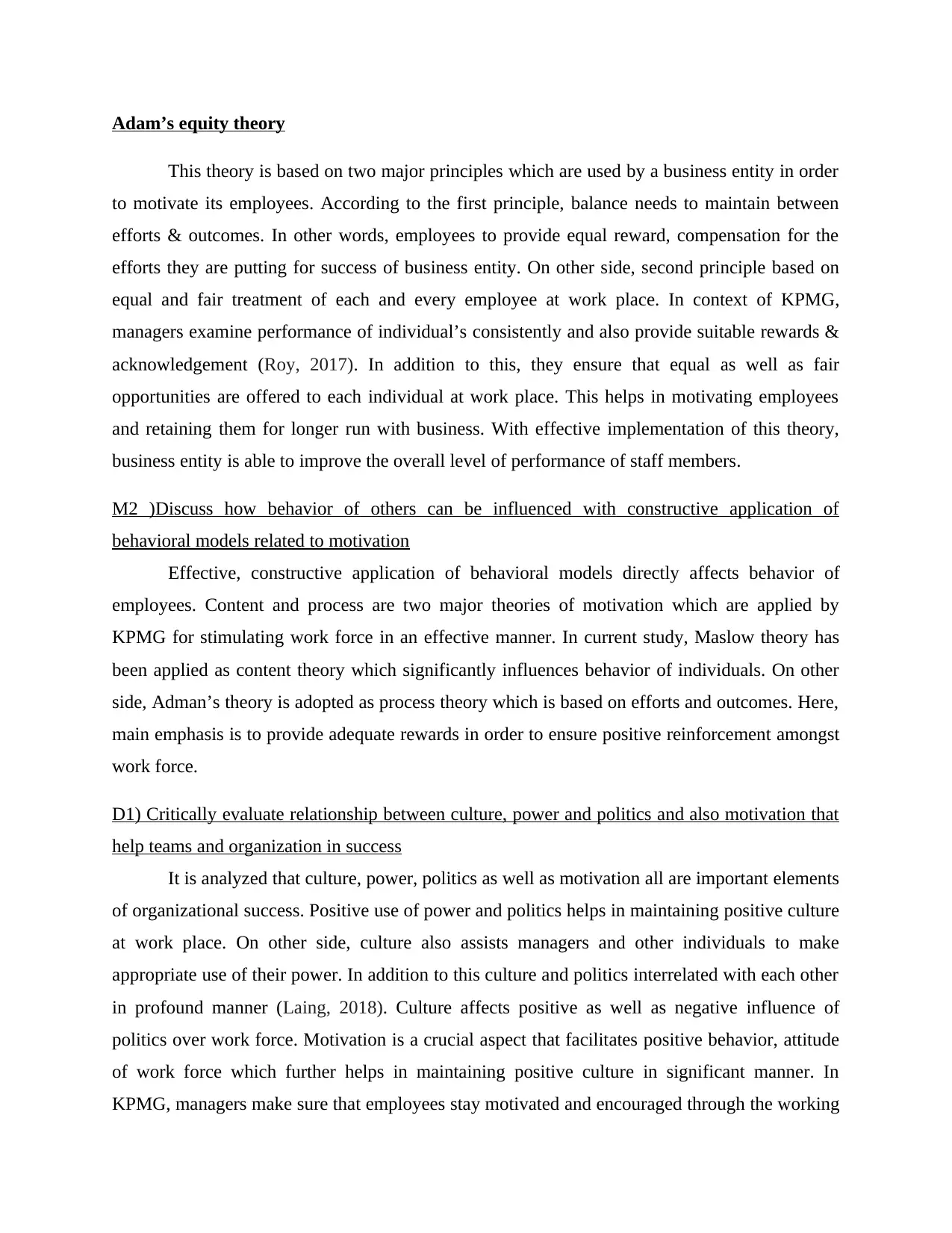
Adam’s equity theory
This theory is based on two major principles which are used by a business entity in order
to motivate its employees. According to the first principle, balance needs to maintain between
efforts & outcomes. In other words, employees to provide equal reward, compensation for the
efforts they are putting for success of business entity. On other side, second principle based on
equal and fair treatment of each and every employee at work place. In context of KPMG,
managers examine performance of individual’s consistently and also provide suitable rewards &
acknowledgement (Roy, 2017). In addition to this, they ensure that equal as well as fair
opportunities are offered to each individual at work place. This helps in motivating employees
and retaining them for longer run with business. With effective implementation of this theory,
business entity is able to improve the overall level of performance of staff members.
M2 )Discuss how behavior of others can be influenced with constructive application of
behavioral models related to motivation
Effective, constructive application of behavioral models directly affects behavior of
employees. Content and process are two major theories of motivation which are applied by
KPMG for stimulating work force in an effective manner. In current study, Maslow theory has
been applied as content theory which significantly influences behavior of individuals. On other
side, Adman’s theory is adopted as process theory which is based on efforts and outcomes. Here,
main emphasis is to provide adequate rewards in order to ensure positive reinforcement amongst
work force.
D1) Critically evaluate relationship between culture, power and politics and also motivation that
help teams and organization in success
It is analyzed that culture, power, politics as well as motivation all are important elements
of organizational success. Positive use of power and politics helps in maintaining positive culture
at work place. On other side, culture also assists managers and other individuals to make
appropriate use of their power. In addition to this culture and politics interrelated with each other
in profound manner (Laing, 2018). Culture affects positive as well as negative influence of
politics over work force. Motivation is a crucial aspect that facilitates positive behavior, attitude
of work force which further helps in maintaining positive culture in significant manner. In
KPMG, managers make sure that employees stay motivated and encouraged through the working
This theory is based on two major principles which are used by a business entity in order
to motivate its employees. According to the first principle, balance needs to maintain between
efforts & outcomes. In other words, employees to provide equal reward, compensation for the
efforts they are putting for success of business entity. On other side, second principle based on
equal and fair treatment of each and every employee at work place. In context of KPMG,
managers examine performance of individual’s consistently and also provide suitable rewards &
acknowledgement (Roy, 2017). In addition to this, they ensure that equal as well as fair
opportunities are offered to each individual at work place. This helps in motivating employees
and retaining them for longer run with business. With effective implementation of this theory,
business entity is able to improve the overall level of performance of staff members.
M2 )Discuss how behavior of others can be influenced with constructive application of
behavioral models related to motivation
Effective, constructive application of behavioral models directly affects behavior of
employees. Content and process are two major theories of motivation which are applied by
KPMG for stimulating work force in an effective manner. In current study, Maslow theory has
been applied as content theory which significantly influences behavior of individuals. On other
side, Adman’s theory is adopted as process theory which is based on efforts and outcomes. Here,
main emphasis is to provide adequate rewards in order to ensure positive reinforcement amongst
work force.
D1) Critically evaluate relationship between culture, power and politics and also motivation that
help teams and organization in success
It is analyzed that culture, power, politics as well as motivation all are important elements
of organizational success. Positive use of power and politics helps in maintaining positive culture
at work place. On other side, culture also assists managers and other individuals to make
appropriate use of their power. In addition to this culture and politics interrelated with each other
in profound manner (Laing, 2018). Culture affects positive as well as negative influence of
politics over work force. Motivation is a crucial aspect that facilitates positive behavior, attitude
of work force which further helps in maintaining positive culture in significant manner. In
KPMG, managers make sure that employees stay motivated and encouraged through the working
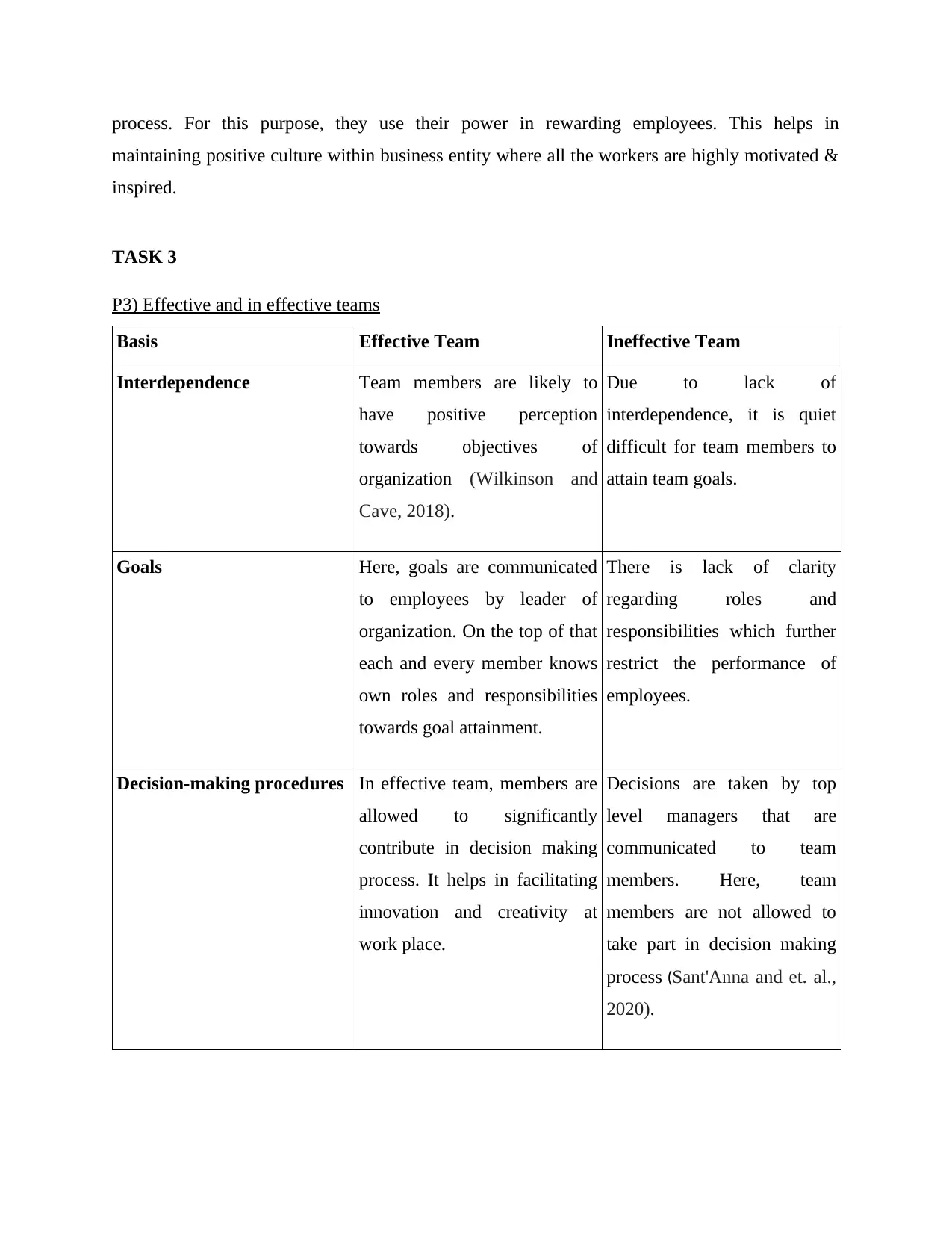
process. For this purpose, they use their power in rewarding employees. This helps in
maintaining positive culture within business entity where all the workers are highly motivated &
inspired.
TASK 3
P3) Effective and in effective teams
Basis Effective Team Ineffective Team
Interdependence Team members are likely to
have positive perception
towards objectives of
organization (Wilkinson and
Cave, 2018).
Due to lack of
interdependence, it is quiet
difficult for team members to
attain team goals.
Goals Here, goals are communicated
to employees by leader of
organization. On the top of that
each and every member knows
own roles and responsibilities
towards goal attainment.
There is lack of clarity
regarding roles and
responsibilities which further
restrict the performance of
employees.
Decision-making procedures In effective team, members are
allowed to significantly
contribute in decision making
process. It helps in facilitating
innovation and creativity at
work place.
Decisions are taken by top
level managers that are
communicated to team
members. Here, team
members are not allowed to
take part in decision making
process (Sant'Anna and et. al.,
2020).
maintaining positive culture within business entity where all the workers are highly motivated &
inspired.
TASK 3
P3) Effective and in effective teams
Basis Effective Team Ineffective Team
Interdependence Team members are likely to
have positive perception
towards objectives of
organization (Wilkinson and
Cave, 2018).
Due to lack of
interdependence, it is quiet
difficult for team members to
attain team goals.
Goals Here, goals are communicated
to employees by leader of
organization. On the top of that
each and every member knows
own roles and responsibilities
towards goal attainment.
There is lack of clarity
regarding roles and
responsibilities which further
restrict the performance of
employees.
Decision-making procedures In effective team, members are
allowed to significantly
contribute in decision making
process. It helps in facilitating
innovation and creativity at
work place.
Decisions are taken by top
level managers that are
communicated to team
members. Here, team
members are not allowed to
take part in decision making
process (Sant'Anna and et. al.,
2020).
⊘ This is a preview!⊘
Do you want full access?
Subscribe today to unlock all pages.

Trusted by 1+ million students worldwide
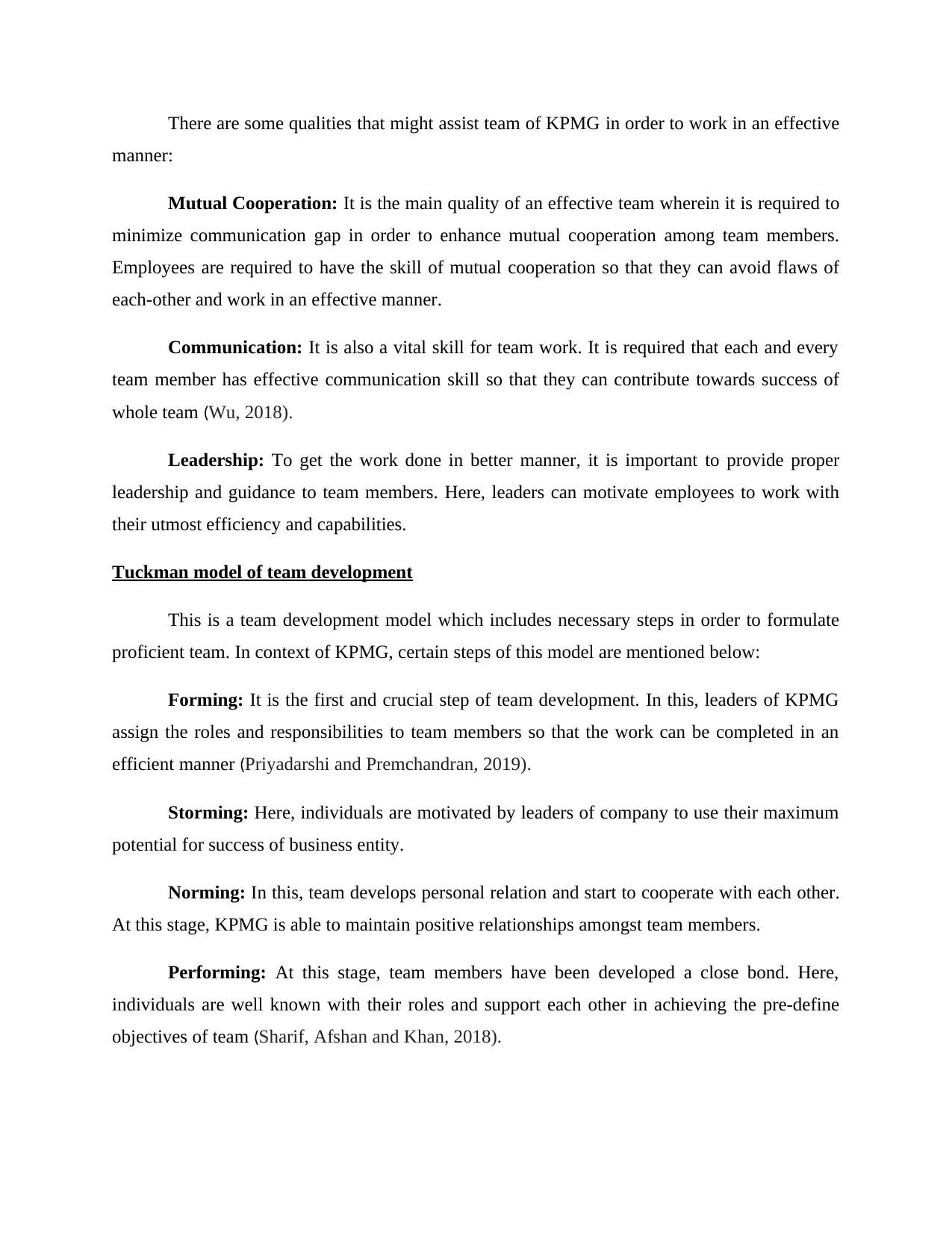
There are some qualities that might assist team of KPMG in order to work in an effective
manner:
Mutual Cooperation: It is the main quality of an effective team wherein it is required to
minimize communication gap in order to enhance mutual cooperation among team members.
Employees are required to have the skill of mutual cooperation so that they can avoid flaws of
each-other and work in an effective manner.
Communication: It is also a vital skill for team work. It is required that each and every
team member has effective communication skill so that they can contribute towards success of
whole team (Wu, 2018).
Leadership: To get the work done in better manner, it is important to provide proper
leadership and guidance to team members. Here, leaders can motivate employees to work with
their utmost efficiency and capabilities.
Tuckman model of team development
This is a team development model which includes necessary steps in order to formulate
proficient team. In context of KPMG, certain steps of this model are mentioned below:
Forming: It is the first and crucial step of team development. In this, leaders of KPMG
assign the roles and responsibilities to team members so that the work can be completed in an
efficient manner (Priyadarshi and Premchandran, 2019).
Storming: Here, individuals are motivated by leaders of company to use their maximum
potential for success of business entity.
Norming: In this, team develops personal relation and start to cooperate with each other.
At this stage, KPMG is able to maintain positive relationships amongst team members.
Performing: At this stage, team members have been developed a close bond. Here,
individuals are well known with their roles and support each other in achieving the pre-define
objectives of team (Sharif, Afshan and Khan, 2018).
manner:
Mutual Cooperation: It is the main quality of an effective team wherein it is required to
minimize communication gap in order to enhance mutual cooperation among team members.
Employees are required to have the skill of mutual cooperation so that they can avoid flaws of
each-other and work in an effective manner.
Communication: It is also a vital skill for team work. It is required that each and every
team member has effective communication skill so that they can contribute towards success of
whole team (Wu, 2018).
Leadership: To get the work done in better manner, it is important to provide proper
leadership and guidance to team members. Here, leaders can motivate employees to work with
their utmost efficiency and capabilities.
Tuckman model of team development
This is a team development model which includes necessary steps in order to formulate
proficient team. In context of KPMG, certain steps of this model are mentioned below:
Forming: It is the first and crucial step of team development. In this, leaders of KPMG
assign the roles and responsibilities to team members so that the work can be completed in an
efficient manner (Priyadarshi and Premchandran, 2019).
Storming: Here, individuals are motivated by leaders of company to use their maximum
potential for success of business entity.
Norming: In this, team develops personal relation and start to cooperate with each other.
At this stage, KPMG is able to maintain positive relationships amongst team members.
Performing: At this stage, team members have been developed a close bond. Here,
individuals are well known with their roles and support each other in achieving the pre-define
objectives of team (Sharif, Afshan and Khan, 2018).
Paraphrase This Document
Need a fresh take? Get an instant paraphrase of this document with our AI Paraphraser
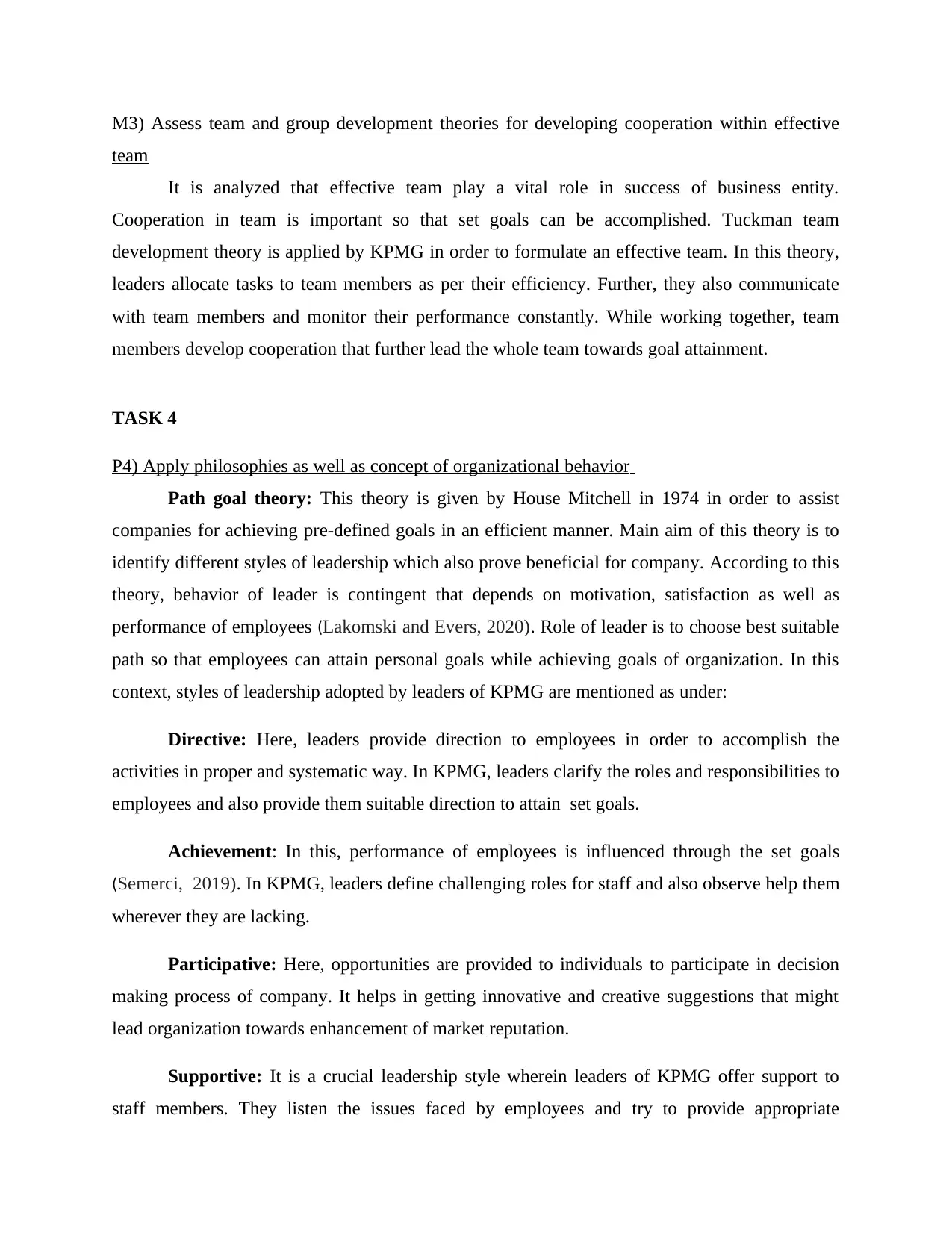
M3) Assess team and group development theories for developing cooperation within effective
team
It is analyzed that effective team play a vital role in success of business entity.
Cooperation in team is important so that set goals can be accomplished. Tuckman team
development theory is applied by KPMG in order to formulate an effective team. In this theory,
leaders allocate tasks to team members as per their efficiency. Further, they also communicate
with team members and monitor their performance constantly. While working together, team
members develop cooperation that further lead the whole team towards goal attainment.
TASK 4
P4) Apply philosophies as well as concept of organizational behavior
Path goal theory: This theory is given by House Mitchell in 1974 in order to assist
companies for achieving pre-defined goals in an efficient manner. Main aim of this theory is to
identify different styles of leadership which also prove beneficial for company. According to this
theory, behavior of leader is contingent that depends on motivation, satisfaction as well as
performance of employees (Lakomski and Evers, 2020). Role of leader is to choose best suitable
path so that employees can attain personal goals while achieving goals of organization. In this
context, styles of leadership adopted by leaders of KPMG are mentioned as under:
Directive: Here, leaders provide direction to employees in order to accomplish the
activities in proper and systematic way. In KPMG, leaders clarify the roles and responsibilities to
employees and also provide them suitable direction to attain set goals.
Achievement: In this, performance of employees is influenced through the set goals
(Semerci, 2019). In KPMG, leaders define challenging roles for staff and also observe help them
wherever they are lacking.
Participative: Here, opportunities are provided to individuals to participate in decision
making process of company. It helps in getting innovative and creative suggestions that might
lead organization towards enhancement of market reputation.
Supportive: It is a crucial leadership style wherein leaders of KPMG offer support to
staff members. They listen the issues faced by employees and try to provide appropriate
team
It is analyzed that effective team play a vital role in success of business entity.
Cooperation in team is important so that set goals can be accomplished. Tuckman team
development theory is applied by KPMG in order to formulate an effective team. In this theory,
leaders allocate tasks to team members as per their efficiency. Further, they also communicate
with team members and monitor their performance constantly. While working together, team
members develop cooperation that further lead the whole team towards goal attainment.
TASK 4
P4) Apply philosophies as well as concept of organizational behavior
Path goal theory: This theory is given by House Mitchell in 1974 in order to assist
companies for achieving pre-defined goals in an efficient manner. Main aim of this theory is to
identify different styles of leadership which also prove beneficial for company. According to this
theory, behavior of leader is contingent that depends on motivation, satisfaction as well as
performance of employees (Lakomski and Evers, 2020). Role of leader is to choose best suitable
path so that employees can attain personal goals while achieving goals of organization. In this
context, styles of leadership adopted by leaders of KPMG are mentioned as under:
Directive: Here, leaders provide direction to employees in order to accomplish the
activities in proper and systematic way. In KPMG, leaders clarify the roles and responsibilities to
employees and also provide them suitable direction to attain set goals.
Achievement: In this, performance of employees is influenced through the set goals
(Semerci, 2019). In KPMG, leaders define challenging roles for staff and also observe help them
wherever they are lacking.
Participative: Here, opportunities are provided to individuals to participate in decision
making process of company. It helps in getting innovative and creative suggestions that might
lead organization towards enhancement of market reputation.
Supportive: It is a crucial leadership style wherein leaders of KPMG offer support to
staff members. They listen the issues faced by employees and try to provide appropriate
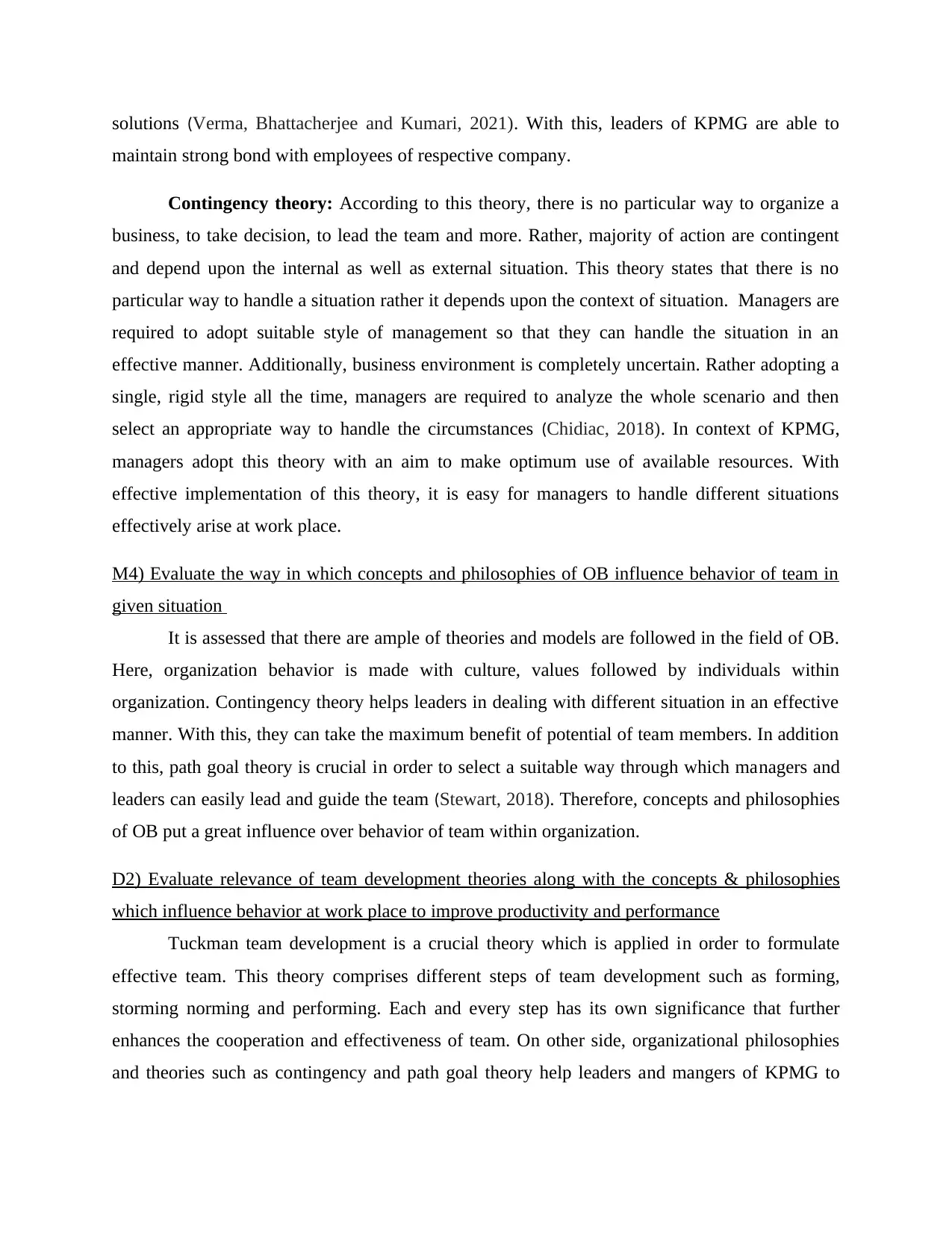
solutions (Verma, Bhattacherjee and Kumari, 2021). With this, leaders of KPMG are able to
maintain strong bond with employees of respective company.
Contingency theory: According to this theory, there is no particular way to organize a
business, to take decision, to lead the team and more. Rather, majority of action are contingent
and depend upon the internal as well as external situation. This theory states that there is no
particular way to handle a situation rather it depends upon the context of situation. Managers are
required to adopt suitable style of management so that they can handle the situation in an
effective manner. Additionally, business environment is completely uncertain. Rather adopting a
single, rigid style all the time, managers are required to analyze the whole scenario and then
select an appropriate way to handle the circumstances (Chidiac, 2018). In context of KPMG,
managers adopt this theory with an aim to make optimum use of available resources. With
effective implementation of this theory, it is easy for managers to handle different situations
effectively arise at work place.
M4) Evaluate the way in which concepts and philosophies of OB influence behavior of team in
given situation
It is assessed that there are ample of theories and models are followed in the field of OB.
Here, organization behavior is made with culture, values followed by individuals within
organization. Contingency theory helps leaders in dealing with different situation in an effective
manner. With this, they can take the maximum benefit of potential of team members. In addition
to this, path goal theory is crucial in order to select a suitable way through which managers and
leaders can easily lead and guide the team (Stewart, 2018). Therefore, concepts and philosophies
of OB put a great influence over behavior of team within organization.
D2) Evaluate relevance of team development theories along with the concepts & philosophies
which influence behavior at work place to improve productivity and performance
Tuckman team development is a crucial theory which is applied in order to formulate
effective team. This theory comprises different steps of team development such as forming,
storming norming and performing. Each and every step has its own significance that further
enhances the cooperation and effectiveness of team. On other side, organizational philosophies
and theories such as contingency and path goal theory help leaders and mangers of KPMG to
maintain strong bond with employees of respective company.
Contingency theory: According to this theory, there is no particular way to organize a
business, to take decision, to lead the team and more. Rather, majority of action are contingent
and depend upon the internal as well as external situation. This theory states that there is no
particular way to handle a situation rather it depends upon the context of situation. Managers are
required to adopt suitable style of management so that they can handle the situation in an
effective manner. Additionally, business environment is completely uncertain. Rather adopting a
single, rigid style all the time, managers are required to analyze the whole scenario and then
select an appropriate way to handle the circumstances (Chidiac, 2018). In context of KPMG,
managers adopt this theory with an aim to make optimum use of available resources. With
effective implementation of this theory, it is easy for managers to handle different situations
effectively arise at work place.
M4) Evaluate the way in which concepts and philosophies of OB influence behavior of team in
given situation
It is assessed that there are ample of theories and models are followed in the field of OB.
Here, organization behavior is made with culture, values followed by individuals within
organization. Contingency theory helps leaders in dealing with different situation in an effective
manner. With this, they can take the maximum benefit of potential of team members. In addition
to this, path goal theory is crucial in order to select a suitable way through which managers and
leaders can easily lead and guide the team (Stewart, 2018). Therefore, concepts and philosophies
of OB put a great influence over behavior of team within organization.
D2) Evaluate relevance of team development theories along with the concepts & philosophies
which influence behavior at work place to improve productivity and performance
Tuckman team development is a crucial theory which is applied in order to formulate
effective team. This theory comprises different steps of team development such as forming,
storming norming and performing. Each and every step has its own significance that further
enhances the cooperation and effectiveness of team. On other side, organizational philosophies
and theories such as contingency and path goal theory help leaders and mangers of KPMG to
⊘ This is a preview!⊘
Do you want full access?
Subscribe today to unlock all pages.

Trusted by 1+ million students worldwide
1 out of 17
Related Documents
Your All-in-One AI-Powered Toolkit for Academic Success.
+13062052269
info@desklib.com
Available 24*7 on WhatsApp / Email
![[object Object]](/_next/static/media/star-bottom.7253800d.svg)
Unlock your academic potential
Copyright © 2020–2026 A2Z Services. All Rights Reserved. Developed and managed by ZUCOL.





